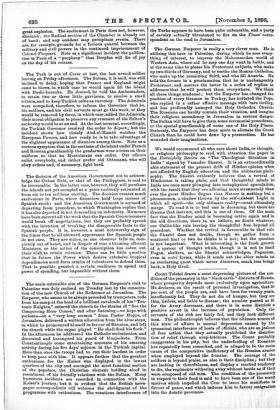Count Tolstoi draws a most depressing picture of the con-
dition of the peasantry in the "black earth" districts of Russia, where prosperity depends most exclusively upon agriculture. He declares, as the result of personal investigation, that 30 per cent. of the people are, and have been for twenty years, insufficiently fed. They do not die of hunger, but they are thin, listless, and liable to disease ; the number passed as fit for the Army decreases, and there is in some districts a positive arrest in the increase of population. Only the servants of the rich are fairly fed, and they look different men. The philanthropist believes that the ultimate source of this state of affairs is mental depression caused by the tyrannical interference of hosts of officials, who are so jealous of free action that they actually prohibited the distribu- tion of relief through soup-kitchens. The Count probably exaggerates in his pity, but the underfeeding of Russians has repeatedly been remarked, and is alleged to be the main cause of the comparative inefficiency of the Russian armies when employed beyond the frontier. The courage of the soldiers is beyond praise, as also is their discipline ; but they are lacking in cheerfulness, and display a marked tendency to die, the regiments withering away without battle as if they were composed of old men. The condition of the peasantry in respect to their food is said to have been one of the many motives which impelled the Czar to issue his manifesto 111 favour of peace, and which induces him to favour emigration into the Asiatic provinces.





















































 Previous page
Previous page